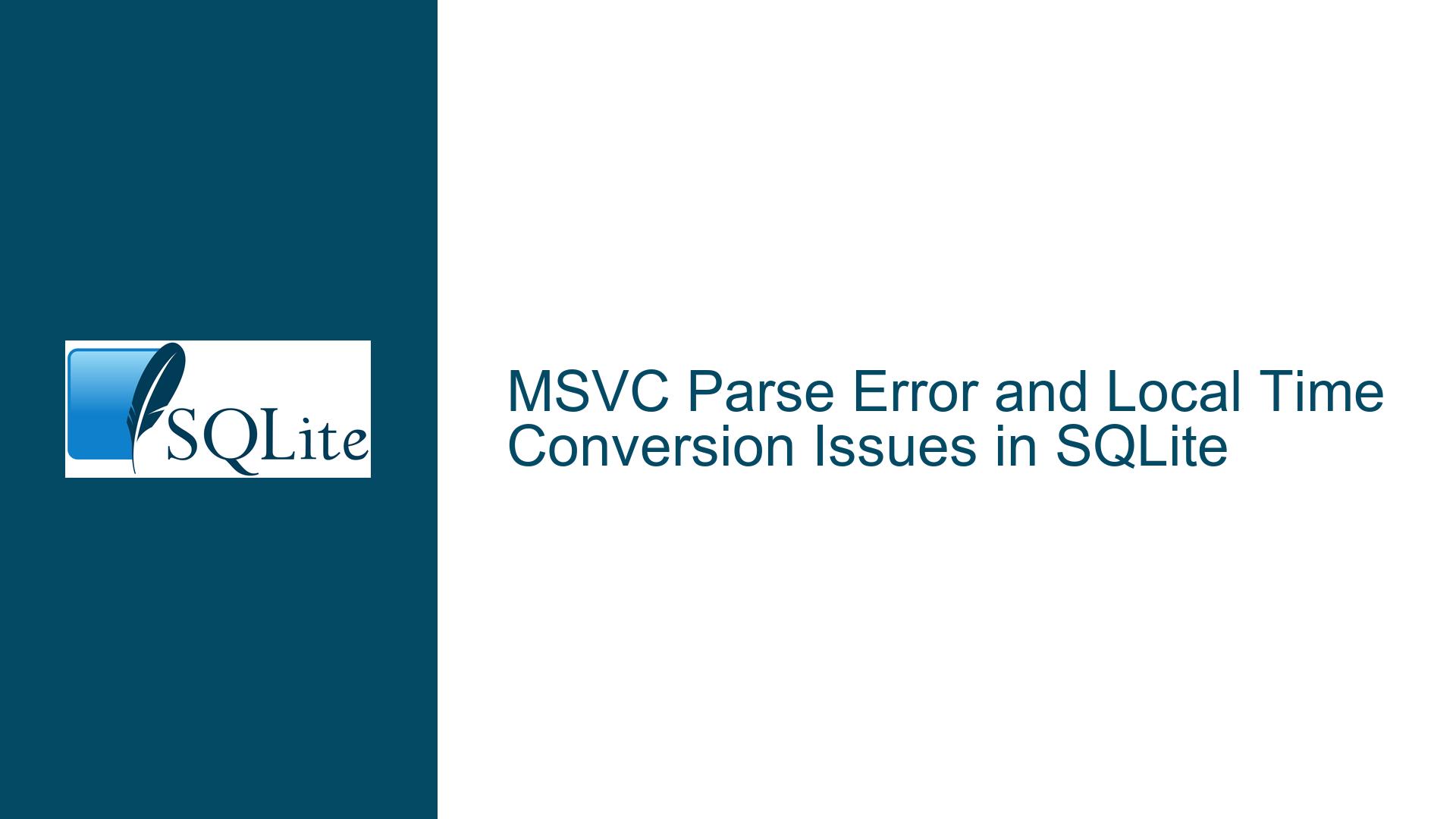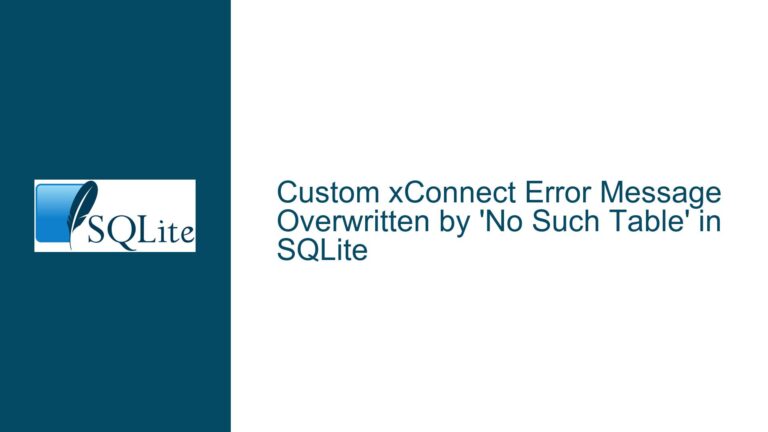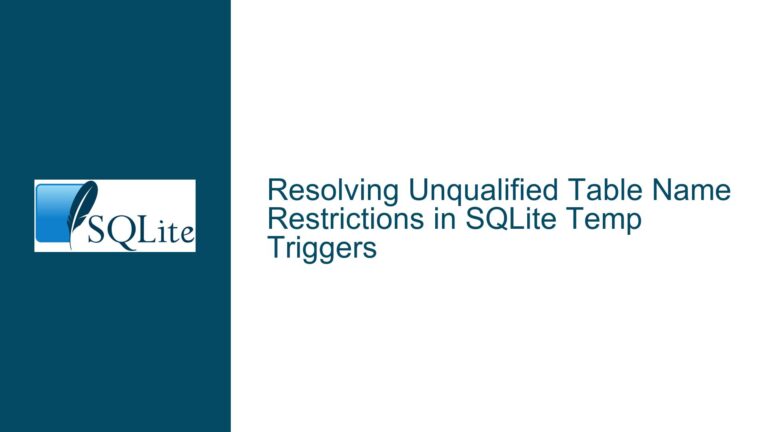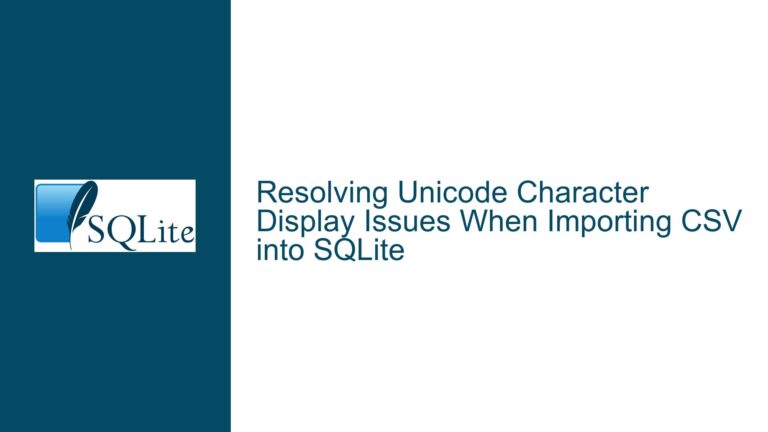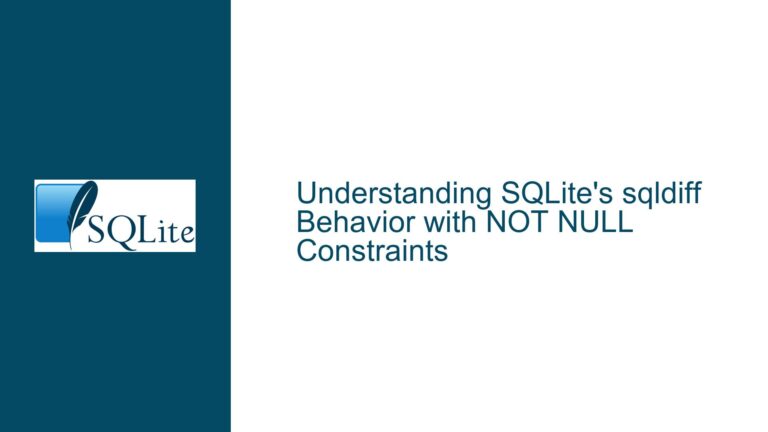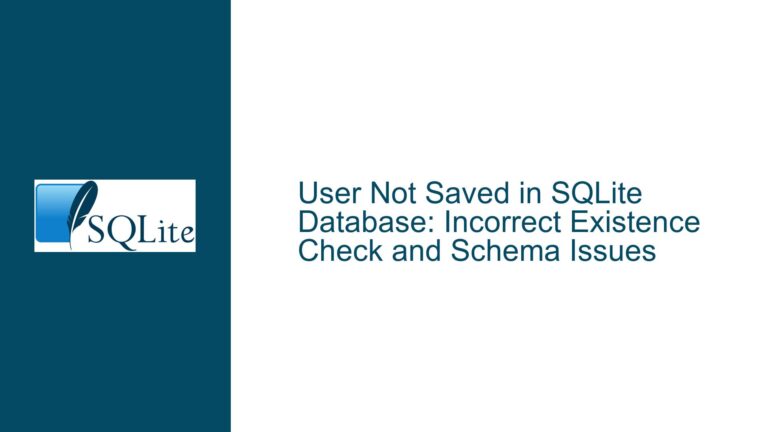MSVC Parse Error and Local Time Conversion Issues in SQLite
Issue Overview: MSVC Parse Error and Local Time Conversion Inaccuracies
The core issue revolves around two distinct but related problems encountered during the compilation and execution of SQLite on Windows using MSVC (Microsoft Visual C++). The first problem is a parse error that occurs when MSVC attempts to compile a specific segment of the SQLite codebase, particularly in the main.c file. The error arises in the context of handling the SQLITE_TESTCTRL_LOCALTIME_FAULT control case, where the code attempts to assign a function pointer using va_arg. The original code snippet, which worked seamlessly with GCC, fails to compile with MSVC due to its stricter type-checking and handling of function pointers.
The second issue pertains to the inaccuracies in local time and UTC conversions, specifically affecting the milliseconds component of timestamps. This problem manifests when SQLite performs time-related operations on Windows, leading to discrepancies that could affect applications relying on precise time measurements. The issue is particularly problematic for applications that require high temporal resolution, such as logging systems, financial applications, or any system where time synchronization is critical.
The parse error in MSVC is not merely a superficial issue but points to a deeper incompatibility between how MSVC and GCC handle certain C language constructs, particularly those involving function pointers and variadic arguments. The local time conversion issue, on the other hand, suggests a potential flaw in the way SQLite interacts with the underlying Windows API for time-related functions. Both issues, while seemingly unrelated, are tied to the broader challenge of ensuring cross-platform compatibility and precision in SQLite’s operations.
Possible Causes: MSVC’s Strict Type Handling and Windows API Limitations
The parse error in MSVC can be attributed to the compiler’s stringent type-checking mechanisms, which are more restrictive compared to GCC. In the problematic code segment, the va_arg macro is used to extract a function pointer from the variadic argument list. The original code attempts to cast the extracted value directly to a function pointer type, which MSVC finds problematic. This is because MSVC requires more explicit type handling when dealing with function pointers, especially in the context of variadic functions. The use of va_arg with function pointers is a known pain point in MSVC, as the compiler does not handle implicit type conversions as gracefully as GCC.
The issue is exacerbated by the fact that the function pointer type in question, int(*)(const void*, void*), is complex and involves multiple levels of indirection. MSVC’s type system struggles with such constructs, leading to the parse error. The workaround proposed in the discussion involves using a typedef to simplify the type declaration, thereby making it more palatable for MSVC. This approach aligns with best practices in C programming, where complex types are often aliased using typedef to improve code readability and compiler compatibility.
The local time conversion issue, on the other hand, is likely rooted in the way SQLite interacts with the Windows API for time-related operations. Windows uses a different internal representation for time compared to Unix-based systems, which can lead to discrepancies when converting between local time and UTC. Specifically, the Windows API’s handling of milliseconds in time functions is known to be less precise, which could explain the observed inaccuracies. Additionally, the issue might be compounded by SQLite’s reliance on the localtime and gmtime functions, which are not guaranteed to provide millisecond-level accuracy on all platforms.
Another potential cause of the local time conversion issue is the way SQLite handles time zones and daylight saving time (DST) transitions. Windows and Unix-based systems may handle these transitions differently, leading to inconsistencies in the converted timestamps. The problem is further complicated by the fact that SQLite’s time functions are designed to be lightweight and portable, which sometimes comes at the cost of precision and accuracy, especially on platforms with less robust time-handling mechanisms.
Troubleshooting Steps, Solutions & Fixes: Addressing MSVC Parse Errors and Time Conversion Inaccuracies
To resolve the MSVC parse error, the first step is to modify the code to make it more compatible with MSVC’s type system. The use of a typedef for the function pointer type is a recommended approach, as it simplifies the type declaration and makes it easier for MSVC to parse. The modified code should look something like this:
typedef int (*AltLocaltimeFunc)(const void*, void*);
case SQLITE_TESTCTRL_LOCALTIME_FAULT: {
sqlite3GlobalConfig.bLocaltimeFault = va_arg(ap, int);
if (sqlite3GlobalConfig.bLocaltimeFault == 2) {
sqlite3GlobalConfig.xAltLocaltime = va_arg(ap, AltLocaltimeFunc);
} else {
sqlite3GlobalConfig.xAltLocaltime = 0;
}
break;
}
This change ensures that the function pointer type is explicitly defined, making it easier for MSVC to handle. Additionally, it improves code readability and maintainability, as the typedef provides a clear and concise name for the function pointer type.
For the local time conversion issue, the solution involves a more comprehensive approach. First, it is essential to verify whether the issue is specific to the Windows platform or if it also occurs on other platforms. This can be done by running the same time conversion tests on both Windows and Unix-based systems and comparing the results. If the issue is indeed specific to Windows, the next step is to investigate the underlying cause, which could be related to the Windows API’s handling of time functions.
One possible solution is to replace SQLite’s reliance on the localtime and gmtime functions with more precise alternatives. For example, the GetLocalTime and GetSystemTime functions in the Windows API provide higher precision and may be more suitable for applications requiring accurate time measurements. However, this approach would require significant changes to SQLite’s time-handling code and could introduce new compatibility issues on other platforms.
Another approach is to implement a custom time conversion function that takes into account the specific quirks of the Windows API. This function could use a combination of Windows API calls and manual adjustments to ensure that the converted timestamps are accurate to the millisecond. While this approach would require more effort to implement and test, it would provide a more robust solution that works seamlessly across different platforms.
In addition to these technical solutions, it is also important to document the issue and provide clear guidance to users on how to work around it. This could include adding comments to the code explaining the issue and the chosen solution, as well as updating the SQLite documentation to highlight the potential pitfalls of using time functions on Windows. By taking a proactive approach to addressing these issues, SQLite can continue to provide a reliable and high-performance database solution for a wide range of applications.
In conclusion, the MSVC parse error and local time conversion issues in SQLite highlight the challenges of maintaining cross-platform compatibility in a complex and widely-used software project. By understanding the root causes of these issues and implementing targeted solutions, it is possible to ensure that SQLite remains a robust and reliable database solution for all users, regardless of their platform or environment.
